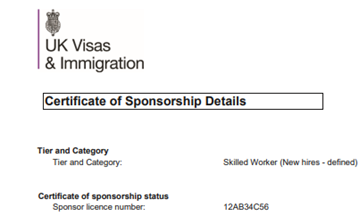A civil penalty notice is a formal warning and fine issued by the UK Home Office when an employer is found to be employing someone who does not have the right to work in the UK. With civil penalty fines increasing to up to £60,000 per illegal worker in 2024, it’s more important than ever for UK employers to understand how civil penalties work—and how to avoid them.
This guide explains:
- Why civil penalties are issued
- How much you could be fined
- What to do if you receive a notice
- How it impacts your sponsor licence
Already received a penalty notice? Contact us to review your options.
Why the Home Office Issues Civil Penalties
The UK government has stepped up enforcement as part of its efforts to curb illegal immigration and reduce net migration. One of its key tools is the civil penalty system under the Immigration, Asylum and Nationality Act 2006.
A civil penalty is issued when the Home Office believes you have employed a worker who does not have the right to work in the UK—and you failed to carry out proper right to work checks.
You could face penalties even if the worker presented seemingly legitimate documents—if you can’t prove a statutory excuse, you may still be held liable.
Civil Penalty Fines in 2025: What Are the New Rates?
The Home Office increased fines significantly in 2024. Here’s what you need to know:
These are per-worker fines, so hiring just two unauthorised workers could cost a business up to £120,000.
What Triggers a Civil Penalty?
Civil penalties are usually triggered by:
- A tip-off from the public or a competitor
- A failed right to work audit
- A Home Office inspection under your sponsor licence
During a visit, Home Office officers will:
- Interview staff
- Review HR files and personnel records
- Check certificate of sponsorship (CoS) allocations
- Inspect sponsor management system (SMS) records
If a worker cannot prove their right to work—or your documentation is missing or incomplete—you may be issued a civil penalty notice.
What Happens After a Home Office Inspection?
If the Home Office finds illegal workers:
- They’ll issue a Referral Notice
- You may receive a Request for Information
- The Civil Penalty Compliance Team (CPCT) reviews your evidence
- You receive either:
- A No Action Notice (if compliant)
- A Warning Notice
- Or a Civil Penalty Notice
If issued a penalty, you’ll have 28 days to respond.
Automate Home Office Audits with Borderless
The Borderless platform provides a centralized system for all sponsorships, automating reminders for key tasks and ensuring best practices across your organization, simplifying audit preparation and ongoing compliance.
Your Options If You Receive a Civil Penalty Notice
✅ Option 1: Pay the Penalty
You can pay the fine in full or apply for a payment plan (usually over 24–36 months).
⚖️ Option 2: Challenge the Penalty
You can submit a written objection within 28 days on grounds such as:
- You are not the employer
- You completed valid right to work checks
- The fine is excessive or incorrect
If unsuccessful, you may appeal to the County Court.
Mitigating a Civil Penalty: How to Reduce the Fine
The Home Office may reduce or cancel a penalty if you:
- Self-reported a suspected illegal worker
- Fully cooperated with the investigation
- Had robust right to work procedures in place
Each mitigation factor could reduce your fine by £5,000 per illegal worker.
How a Civil Penalty Impacts Your Sponsor Licence
If you’re a registered sponsor, receiving a civil penalty can have major consequences:
- Downgraded licence rating (from A to B)
- Mandatory action plan
- Suspension or sponsor licence revocation
- Cooling-off period before reapplying (up to 5 years)
You’ll also lose access to assign Defined or Undefined CoS — blocking you from sponsoring foreign staff.
Civil Penalty vs. Criminal Conviction
A civil penalty is not a criminal conviction, but knowingly employing illegal workers is a criminal offence. You could face:
- Unlimited fines
- Up to 5 years in prison
Repeat breaches may also trigger criminal investigations.
Does a Civil Penalty Go on Record?
While civil penalties don’t show up on criminal background checks, they are recorded by the Home Office, and:
- May affect future sponsor licence applications
- Can damage credit ratings for directors
- May be disclosed during due diligence or acquisitions
Best Practices to Avoid a Civil Penalty
- Run compliant right to work checks (manually or via tools like Borderless)
- Use the SMS properly and on time
- Keep accurate CoS records and visa expiry dates
- Automate alerts for expiring documents
- Report changes of circumstances within required timeframes
Final Thoughts: Don’t Risk It
Civil penalties are serious — they can:
- Drain your finances
- Threaten your business model
- Destroy your ability to hire internationally
But they’re avoidable with the right systems and compliance culture.
Book a call with Borderless to:
- Review your sponsor risk
- Automate compliance workflows
- Stay audit-ready, always






